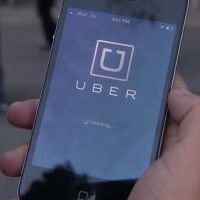Uber and Others Buck DMV on Registering Vehicles as Commercial

Uber CEO Travis Kalanick said this past week that his ride-sharing company’s annual $500 million in gross revenue from operations in San Francisco is three times bigger than the city’s entire taxi industry. But if he is going to continue the meteoric rise of his 4-year-old startup in California, he is going to have to get past one small stumbling block.
The company has a policy requiring its drivers to have a personal automobile registration, according to BuzzFeed, while the state Department of Motor Vehicles (DMV) requires commercial plates. At the beginning of the month, the DMV put out a public notice (pdf) reminding interested parties that it was the law:
“Any passenger vehicle used or maintained for the transportation of persons for hire, compensation, or profit is a commercial vehicle. Even occasional use of a vehicle in this manner requires the vehicle to be registered commercially.”
The DMV said it clarified the matter in response to inquiries from dealers and customers who said they had received different information.
Some of that information may have come from Uber, where, BuzzFeed says, at least a dozen drivers who registered their cars as commercial vehicles were told they could no longer drive for the company. They quoted an e-mail from an Uber rep telling a driver,
“We are showing your vehicle registration is actually a commercial vehicle registration. We will need you to contact the DMV to have them update your vehicle registration to personal/automobile registration. We are unable to accept commercial registration on an uberX account.”
The difference of opinion is just the latest between app-driven ride-sharing companies and government over their business model. Government is inclined to regulate them as part of the transportation industry, while they claim to be just an app. There are ongoing fights over competing with shuttles at airports, background checks of drivers, insurance requirements, safety, pricing and treatment of employees.
Although critics and skeptics abound, Uber’s 2014 gross revenues in San Francisco doubled the previous year’s. Investors have valued the company at $40 billion and it is expanding internationally. And contracting a little on the way.
Last month, Uber shut down in Spain after a Madrid court banned them from operating. The company was ordered to cease operation in the Netherlands, too, and is embroiled in legal battles across the U.S. and Europe. Uber was banned in Germany in September, and then reinstated two weeks later. New laws that took effect on January 1 in France will be hard on the company, if enforced.
Uber says it will keep operating until the courts tell it not to.
–Ken Broder
To Learn More:
Flouting Law, Uber Suspends Drivers for Properly Registering Cars (by Ken Bensinger, BuzzFeed)
California DMV Says Uber, Lyft Cars Must Have Commercial Plates (by Patrick Hoge, San Francisco Business Times)
Uber in S.F. Is Now Three Times Bigger than City's Entire Taxi Industry (by Marlize van Romburgh, San Francisco Business Times)
Uber CEO Reveals Mind-Boggling New Statistic That Skeptics Will Hate (by Henry Blodget, Business Insider)
Uber Is Raking in Money in SF, but the Story Is Complicated (by Carmel DeAmicis, Gigaom)
Uber Is Bigger Than the Whole Taxi Market of San Francisco, Plans to Expand Further into EU (by Sikander Mahmood, TechFrag)
S.F. and L.A. Engage in the International Pastime of Suing Uber (by Ken Broder, AllGov California)
- Top Stories
- Controversies
- Where is the Money Going?
- California and the Nation
- Appointments and Resignations
- Unusual News
- Latest News
- California Forbids U.S. Immigration Agents from Pretending to be Police
- California Lawmakers Urged to Strip “Self-Dealing” Tax Board of Its Duties
- Big Oil’s Grip on California
- Santa Cruz Police See Homeland Security Betrayal in Use of Gang Roundup as Cover for Immigration Raid
- Oil Companies Face Deadline to Stop Polluting California Groundwater





